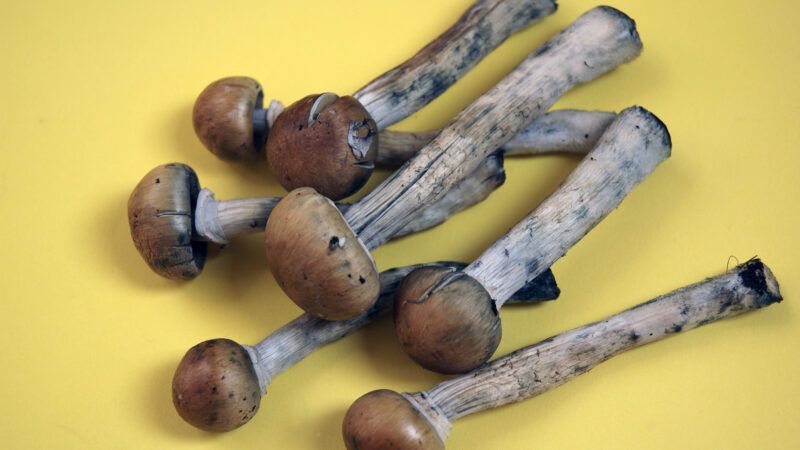Seattle Just Became the Largest U.S. City To Approve Quasi-Decriminalization of Natural Psychedelics
The resolution urges police to refrain from arresting people for noncommercial production and distribution as well as possession.

Seattle just became the largest city in the country with a hands-off policy for people who consume natural psychedelics. Yesterday the city council unanimously approved a resolution that says "the investigation, arrest, and prosecution of anyone engaging in entheogen-related activities should be among The City of Seattle's lowest enforcement priorities." It urges the Seattle Police Department to "move toward the formal codification and adoption of that practice as departmental policy."
The new policy, which is similar to the one approved by Washington, D.C., voters last November, applies to "any living, fresh, dried, or processed plant or fungal material, including teas or powders, that may contain currently scheduled or analog psychoactive indolamines, tryptamines, or phenethylamines, including, but not limited to, psilocybin mushrooms, ayahuasca tea, mescaline, and iboga." It covers "cultivation" and "sharing" of such "entheogens" as well as possession, which already was covered by a general city policy of refraining from arresting drug users.
Seattle joins several other U.S. cities in urging tolerance of psychedelic use. In 2019, Denver voters approved a groundbreaking initiative that made adult possession of psilocybin the city's lowest law enforcement priority and prohibited the use of public money to pursue such cases. Last year, the city councils of Ann Arbor, Michigan; Oakland, California; and Santa Cruz, California, enacted similar measures.
Oregon voters went further last November by passing a ballot initiative aimed at establishing state-licensed "psilocybin service centers" where adults can legally consume the drug under the supervision of a "facilitator" after completing a "preparation session." The initiative says regulators "may not require a client to be diagnosed with or have any particular medical condition as a condition [of] being provided psilocybin services." Another Oregon ballot initiative approved in November decriminalized low-level possession of drugs, including psilocybin and other psychedelics.
Although Seattle's resolution endorses "full decriminalization" of "entheogen-related activities," it does not affect state penalties for producing, distributing, or possessing psychedelics. Under Washington law, psychedelics such as LSD, psilocybin, mescaline, and dimethyltryptamine are still classified as Schedule I drugs, meaning they are banned for all purposes.
Last February, the Washington Supreme Court effectively decriminalized simple drug possession by overturning a law that made possession a felony without any evidence of intent or knowledge. The legislature responded by approving a new law that included a mens rea requirement. That law also changed simple possession of a controlled substance from a Class C felony, punishable by up to five years in prison and a maximum fine of $10,000, to a gross misdemeanor, which carries a maximum penalty of a year in jail and a $1,000 fine.
Those new provisions expire on July 1, 2023, returning Washington to the situation after the state Supreme Court ruling. Marijuana Moment reports that "the expiration date is meant to bring lawmakers back to the table to renegotiate a path forward after experimenting with the new approach." A bill introduced in February would eliminate penalties for possessing "personal use amounts" of controlled substances, including psychedelics.
"It is a long overdue conversation to decriminalize these non-addictive natural substances," Seattle Councilmember Andrew Lewis, who introduced the psychedelic resolution, said in a press release. "Our law enforcement officials certainly have more important things to do than arrest people for possession of entheogens, and this resolution affirms that."
That press release says "entheogens, commonly known psychedelics, have been shown to benefit the well-being of individuals suffering from depression, severe anxiety, problematic substance use, post-traumatic stress, end-of-life anxiety, grief, and intergenerational trauma." It adds that "these and other physical and mental conditions are plaguing many communities, which have been further demonstrated to be exacerbated by the impact of COVID-19."
Despite that medicalized language, the resolution is not limited to people with psychiatric diagnoses. It applies to production and noncommercial distribution "for use in religious, spiritual, healing, or personal growth practices," which would cover pretty much any situation, as long as a supplier had an avowedly serious purpose. Even in relatively tolerant Seattle, using psychedelics just for fun is still officially frowned upon.
